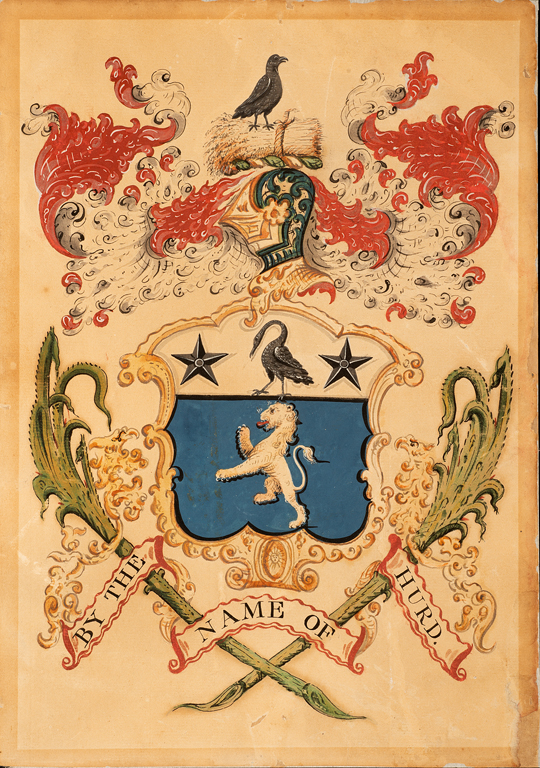| Maker(s): | Coles, John, Sr. (attributed); Coles Jr., John (attributed) | | Culture: | American (c.1749-1809) (1776-1854)
| | Title: | coat of arms: By the Name of Hurd
| | Date Made: | circa 1800
| | Type: | Drawing
| | Materials: | watercolor, ink, paper, wood, glass
| | Place Made: | United States; Massachusetts; Boston
| | Measurements: | Frame: 16 5/8 x 12 1/2 x 1 1/16 in; 42.2 x 31.7 x 2.7 cm; Sheet: 14 x 9 3/4 in; 35.6 x 24.8 cm
| | Accession Number: | HD 2431.2
| | Museum Collection: | Historic Deerfield
|
|

|
Description:
Framed coat of arms titled "BY THE NAME OF HURD" done in watercolor, pen and ink on paper, which is attributed to John Coles Sr. (c.1749-1809) or to his son John Coles, Jr. (1776-1854). The arms are azure a lion rampant or. On a chief argent a crane between two mullers sable. The crest is a raven sable on a garb in fess. On the ribbon below the arms is the motto, "BY THE/ NAME OF/ HURD." According to research by Janine Skerry, former Assistant Curator, c. 1980, "there is no connection between these arms and the Boston silversmith Jacob Hurd. She was not able to authenticate that these are arms of any Hurd family member. John Coles had little genealogical knowledge and she thinks that this is likely one of his productions assembled to suit a paying customer. She was also not able to trace the coat of arms in Papworth nor the crest in Fairbairn's Book of Crests." John Coles Sr. was first listed in the Boston Directory as a publisher and painter in 1782, the year he published John Norman's engravings of portraits of George and Martha Washington based on Benjamin Blyth copies. In 1776, John Hancock (1737-1793) commissioned Charles Willson Peale (1741-1827) to paint these portraits, which may have been taken to Boston in 1777 for safety. Benjamin Blyth could have made copies of these then or from copies made by John Trumball (1756-1843) in 1777. In 1788, Coles was listed as a painter and as a heraldry painter in 1796, which listing continued through 1813; he owed and probably used as his design source a 1724 edition of John Guillim's, "Display of Heraldry." His son, John Coles Jr. (1776-1854), also a portrait, miniature and heraldic painter, was listed in the Boston city directories from 1803 to 1825, and later lived in Providence; had a winter studio in Hartford and summer home in Durham, Connecticut, from 1831-1848; and in Worcester. See also coats of arms, "By the Name of Russell" (HD 71.105); "By the Name of Jones" (HD 2431.1); and "By the Name of Williams" (HD 2009.32), attributed to John Coles, Sr.
Label Text:
Throughout the 18th century Americans maintained the English aristocratic tradition of prominently displaying their family coat of arms in their homes. This painting of the arms of the Hurd family is similar to numerous examples executed by John Coles, Sr., a Boston heraldry painter. Coles characteristically placed the name of the family in the scrolls beneath the shield, a location more commonly reserved for a motto. The crossed green branches, closed helmet, and standard size of paper are also typical of Coles's work.
Subjects:
Glass; Watercolor painting Link to share this object record:
https://museums.fivecolleges.edu/detail.php?t=objects&type=ext&id_number=HD+2431.2 |